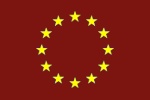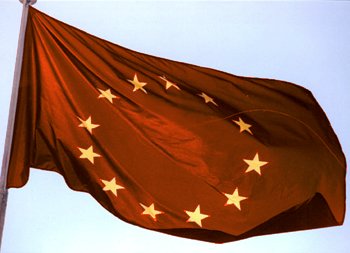Ferrier
Administrateur


 Nombre de messages : 18530 Nombre de messages : 18530
Localisation : Europe-Nation
 |  Sujet: Les dieux indo-européens (site) Sujet: Les dieux indo-européens (site)  Mar 31 Oct - 11:08 Mar 31 Oct - 11:08 | |
| - Citation :
- Perkwúnos
Perkwúnos ("Striker") is the god of thunder and lightning. He is a god of war, particularly against outside dangers and in defense of his people. Some Indo-European versions of him (Thor and Mars) are associated with farmers.
In some of the descendant traditions his name comes from one of his titles, the Thunderer. Thus we have the Norse Thor (<*Thunaraz) and Celtic Taranis. Another name by which he might be know is *Koryonos, “god of the warband.”
Perkwúnos survived by name in Albania (Perendi), Thrace (basically the area of modern Bulgaria) (Perkos), India (Parjanya), and Anatolia (Pirwa). His worship survived best among the Balts, under the name of Perkunas. This Baltic hero was a defender of truth, protector against evil, and ensurer of fertility. Like Perkunas, Perkwúnos has the double-headed axe for his symbol. This may be of the sacred metal iron. It may also be of flint. In European folklore, Neolithic axes, often turned up by farmers when ploughing, were believed to be actual thunderbolts. This connects with a belief held of Perkunas that the first thunderstorms of spring fertilized the fields. These beliefs connected with Perkunas were most likely held regarding Perkwúnos. This great fighter is a therefore a defender of truth, a provider of fertility, and a source of protection to his followers. His primary myth tells how he killed a mighty serpent. In chapter 6 this myth will be told in full; for now, though, I would like to emphasize that because of it he is the original and continual protector of Cosmos against Chaos.
His weapon is a club or double-headed axe, the wagros. He throws this and it returns to him to be thrown again. It does not take much imagination to see an image of lightning here.
Perkwúnos' sacred animal is the bull. The bull is an animal of great power, rampant sexuality, and danger. The hoofbeats of a running bull suggest thunder. One of the Proto-Indo-European words for "bull," *wisontos, means "the one who urinates." The combination of bellowing and urination brings to mind the god of thunderstorms.
The ancient connection between Perkwúnos and Dyéus Patér is well expressed in the comparison between the unpredictable, passionate bull (the stormy sky), and the placid, rulable ox (the clear sky).
*Perkw- is also the source of words meaning "oak," perhaps because oaks were believed to be often struck by lightning. The most famous is the Latin "querquus," familiar from the name of Albuquerque ("white oak"), New Mexico. Other descendants are linked with "mountain" (Gamkrelidze and Ivanov, 1995, pp. 526 - 527).
This complex of ideas - striking, lightning, oak, and mountain - identifies Perkwúnos with the axis mundi. This fits with his position as defender of truth; he is the support of the universe. The oak connection also emphasizes his strength, integrity, and tenacity. The root *dreu-, from which comes English "tree" and "true," formed the root for "oak" in some languages. Perkwúnos is hard, even stubborn. But stubbornness in defense of truth is a virtue.
Lord of lightning, mighty warrior,
Slayer of serpents, dry earth wetter.
Perkwúnos, lord, earth's great hero.
Perkwúnos, lord, you I praise.
Friedrich, Paul. Proto-Indo-European Trees. Chicago: University of Chicago Press, 1970.
Gamkrelidze, Thomas V. and Ivanov, Vjaceslav V. Indo-European and the Indo-Europeans: A Reconstructionand Historical Analysis of a Proto-Language and a Proto-Culture. tr. Johanna Nichols. New York: Mounton deGruyter, 1995.
Gimbutas, Marija. Perkunas/Perun: The Thunder God of the Balts and the Slavs. Journal of Indo-Europeantudies 1:4 (Winter, 1973), pp. 466 - 478.
Watkins, Calvert. How to Kill a Dragon. New York: Oxford University Press,1995. http://www.ceisiwrserith.com/pier/index.htm | |
|
